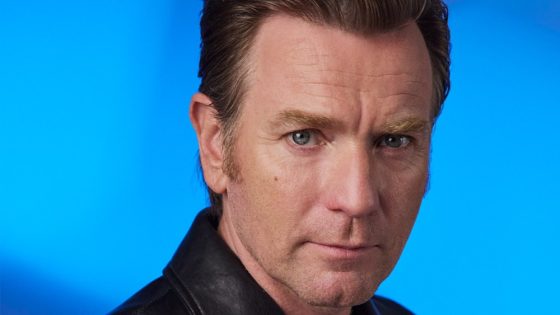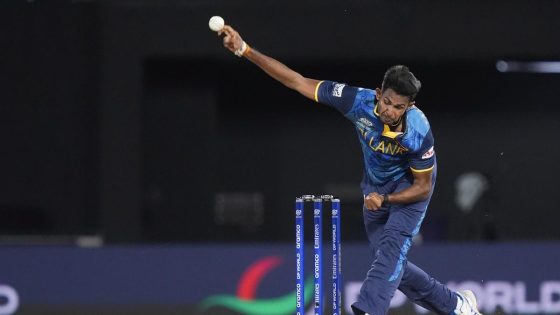The roles played by Ewan McGregor have taken him far: to a galaxy far, far away (three “Star Wars” prequels and their small-screen follow-up, “Obi-Wan Kenobi”); to post-Bolshevik Revolution Russia (“A Gentleman in Moscow”); even to the bottom of the worst toilet in Scotland (“Trainspotting,” the second of four collaborations with filmmaker Danny Boyle).
Yet outside of a handful of movie premieres and a visit to the Dolby (formerly Kodak) Theatre that ended with his Porsche 550 Spider replica broken down outside the parking lot (“Superman came over, and then Spider-Man and then Marilyn Monroe — it was a who’s who standing ‘round a broken replica of James Dean’s car”), the first time McGregor will make a dedicated trip to the Hollywood Walk of Fame will be when he receives his own star, on Thursday. Not unlike the lifetime achievement award he received (at age 41, no less) from the San Sebastián International Film Festival in 2012, he says it’s an honor for which he’s grateful, but it’s up to his presenters to determine if he’s earned it.
“If anyone gives you an award for anything, you’re pretty chuffed about it,” McGregor tells Variety. “You’re always just pleased to be thought of. But I don’t know how I feel about it… obviously very pleased and honored and grateful, and a little bit embarrassed as well.”
Given his resume, which in addition to the credits listed above includes “Velvet Goldmine,” “Moulin Rouge!,” “Black Hawk Down” and “Big Fish” alongside TV projects like “Fargo” and “Halston,” the actor has little reason for embarrassment. From his first days as a stagehand at the Perth Repertory Theatre in Scotland, McGregor says that he remembers declaring his career ambitions early, if not altogether humbly. “I watched the actors and I learned from them. One of them was up for an advert or something, and I was 16, and I was like, ‘Oh, I’d never do that — I only ever want to do work that’s important’,” he remembers.
“What an arrogant thing to say!” he acknowledges, laughing. “But I did in my clumsy way mean it. And when I say I’ve achieved my dreams, I think I’ve done work that has been important to people who’ve watched it.”
“Trainspotting”
Moviestore Collection/REX Shutterstock
His collaboration with Boyle, who hired McGregor for his directorial debut, “Shallow Grave,” proved formative. “He understood how to direct in order to encourage and release good work. I always look back and think he set the bar so high.” If that, its follow-up, “Trainspotting,” and their third partnership in as many years, “A Life Less Ordinary,” offered him fulfilling creative challenges, being cast in George Lucas’ hotly anticipated prequel “Star Wars: Episode I — The Phantom Menace” would prove tougher, even as it catapulted him to a new level of commercial success.
“It’s always the same responsibility, to be believable in this character, in this story,” he says. “In the ‘Star Wars’ world, it was in the early days [with] the technology, and the green screen doesn’t aid the actor. It’s not helpful.”
Hayden Christensen, who played his young Padawan Anakin Skywalker in “Attack of the Clones” and “Revenge of the Sith” before assuming the character’s villainous alter ego Darth Vader in “Obi-Wan Kenobi,” remembers McGregor mentoring him not just in the ways of the Force, but in navigating the then-nascent ways of green screen acting. “The first time I met Ewan was in Australia,” Christensen says. “I remember walking into the hair and makeup room, and he came over and gave me a big hug. Right away I knew that I was standing in front of a friend.”
“He really took me under his wing,” Christensen adds. “It’s easy to get caught up in the technicalities of making those films. But he always just brought it back to the emotional aspect of what we were doing.”

“Star Wars Episode II: Attack of the Clones”
©Lucasfilm Ltd./Courtesy Everett Collection
McGregor’s own love for the franchise was what prompted him to take the plunge into Lucas’ cinematic universe, but it also forced him to compartmentalize that fandom as he explored it from the inside. “Me and my brother watched the first ‘Star Wars’ films a million times, like most people my age. They were so important to us,” he recalls. “So I had to switch something off in my head to be able to cope with the bigness of all that and just get on with it.” Portraying a younger version of Alec Guiness’ Obi-Wan Kenobi afforded him a welcome opportunity to research his predecessor’s filmography, and eventually gave him a benchmark to strive for as he’s returned to the role multiple times.
“I loved, more than anything, getting to know Alec Guinness’ work because I was playing him as a young man,” he says. “Even now with the series, that’s my personal challenge — if a take feels a bit like him, I’m happy.” McGregor adds that even after 25 years, he hasn’t tired of playing the role. “I really do hope we get a chance to do another one,” he says. “Between where we ended off in the series and when Alec Guinness comes on screen with Luke Skywalker, I think there’s another few stories to tell in there.” Christensen, who’ll present McGregor with his Walk of Fame star, shares his enthusiasm for more “Obi-Wan Kenobi,” especially if it leads to another front-row seat to watch him in the role.
“If it means that I got to do more with Ewan, then that’s a no-brainer, but I really hope that he continues with the character,” Christensen says. “Just as a fan, it’s so exciting to get to watch him play Obi-Wan — he’s just so good at it.”

“Moulin Rouge!”
Courtesy of 20TH CENTURY STUDIOS
Though he’s now played Obi-Wan Kenobi for long enough to be at least as synonymous with the character as Guinness (certainly for generations who were raised on the prequel trilogy), McGregor has simultaneously managed to work with a murderer’s row of filmmakers over his career — among them Peter Greenaway, Todd Haynes, Baz Luhrmann, Ridley Scott, Roman Polanski and Ron Howard — whose individual collaborations would merit the kind of canonization for another actor that he’s receiving with this honor. He says that adapting to their different leadership styles has occasionally proven challenging; McGregor particularly remembers getting some pointed feedback from Woody Allen on the set of “Cassandra’s Dream.”
“Once, he walked over to me and went, ‘I can hear every seat in the cinema flapping up,’ like I was boring everyone to death and everyone’s leaving,” McGregor remembers. “I was like, ‘Oh, thanks, Woody.’ So me and Colin Farrell, as soon as we saw each other, we’d start running lines because there were huge long scenes, and he doesn’t like to do or doesn’t often do coverage — which is wonderful to do as an actor because it’s a bit like being on stage, but you have to be up to speed.”
He indicates that he developed some special relationships with a few of the other filmmakers, including “Beginners” director Mike Mills, who’s one of the colleagues who will also be presenting McGregor’s star. “Mike was brilliant, in terms of his appreciation of acting and the belief that that should be given and time and focus on set,” he says. “He has that balance right, where it does feel like the performance is everything and the cinematography and everything adds to it.” Meanwhile, after “Big Fish,” he’d hoped to find another director with whom he could maintain the kind of relationship he did with Boyle. “I had great hopes that I would be Tim Burton’s new Johnny Depp,” he confesses. “But of course Johnny Depp is still Tim Burton’s Johnny Depp, so I didn’t get a chance.”
Each time, McGregor says he’s been fortunate enough for those filmmakers to be the ones to approach him with an opportunity. In fact, reaching out first hasn’t paid off for him in the past: “The only time I’ve reached out to a director was to Jonathan Glazer, after I watched ‘Under the Skin’,” he reveals. “I’ve never met him, and I don’t know him, but I did write a letter through my agent saying, ‘I just only want to work with you.’ I never heard from him!”
After decades of on-set education from master-class directors, McGregor helmed his first film, “American Pastoral,” in 2016. Though he says he loved the experience, he admits he’s unsure when he’ll try it again. “I’ve never felt more alive than and scared and responsible,” he says. “As the actor and the director, I had to be treated like a grown-up person. I did make the film that I wanted to make, and I was very proud of it. But when it opened and nothing happened, it broke me a bit.”
One incentive to do so, he says, is the opportunity to provide a showcase for his “Fargo,” “Birds of Prey” and “A Gentleman in Moscow” costar (and as of 2022, wife) Mary Elizabeth Winstead. “I’d love to direct Mary in something,” says McGregor. “I think she’s an amazing actor, and I would love to find a script that was like an absolute powerhouse vehicle for her. I think if it happens again, that’s what I would like to find.”
“Moscow” not only marks his third meaty television project in as many years, after “Halston” and “Obi-Wan Kenobi,” but further expands his skill set to executive producing. Even if the ceremony doesn’t net him a call from Glazer, he hopes that it generates a bit of visibility — if not for him, then for the fans and colleagues feeling like they look at the entertainment industry from the outside.
“Sometimes when you see the Globes or the Oscars happening, you can think, that’s Hollywood,” he says. “I don’t know that I’m part of that gang, but this star might make other people feel more confident to claim their space in this world, and in this business — to feel worthy of it all.”
Source Agencies



